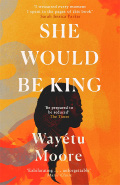Black Herstory & Futures — Review of She Would Be King by Wayétu Moore
She Would Be King, by award-winning author Wayétu Moore, centers the stories of three characters as their individual and collective experiences are told via historical fiction and magical realism. The late 2018 novel explores the Indigenous history of Liberia and the attempts to colonize the region. As the story progresses, the three characters convene across continents, connected by the spiritual power each one possesses. Through their connection, the main characters Gbessa, June Dey, and Norman Aragon come together in an effort to stop regional slave traders and free those in bondage.
Set in the early nineteenth century, the audience is introduced to Gbessa, a young woman exiled from her village because she is believed to be an accursed ‘witch’. Following her exile, Gbessa faces starvation, is bitten by a viper, and nearly dies — but she survives as her immortality is revealed. June Dey is the second character revealed by the author. June Dey, born on a plantation in Virginia is haunted by his separation from his parents and is ostracized due to his superhuman strength. In an attempt to escape on a boat to New York, he finds himself on an African Grain Coast. Finally, readers are introduced to Norman Aragon. Norman lives on an island in Jamaica. He is the son of a British scholar who has kept him and his mother enslaved due to their power to vanish at any point in time. At age 10, Norman leaves with his mother on a boat to Africa, upon their arrival Norman is forced to leave his mother, where he eventually comes in contact with June Dey and Gbessa.
Throughout the novel, Moore continuously uses the power of the wind to connect these disparate characters. Gbessa often relies on spirituality and the voice of the wind calling to her to give her strength throughout the novel. The wind not only speaks to Gbessa, but acts as a counselor for each character while at some points narrating.
Personally, I really enjoyed the role of the wind not only as a character but also as a narrator. Having little experience with the genre of magical realism and little understanding of the spirituality and culture of Indigenous Liberia, the wind connected these two elements of the story seamlessly and powerfully. The wind emphasizes the theme of fate that plays an important role throughout the novel, bringing the characters together no matter how deadly the obstacles are.
Moore does a wonderful job of displaying a narrative that encompasses the history of Liberia and the Indigenous traditions that existed during that time period. Through her clear deep research, Moore connects the experience of Southern enslaved people during the mid-1800s and the illegal slave trade alive in Liberia, specifically near Monrovia. Not only did She Would Be King expose me to history and narratives that I had not read before, but did so through excellent storytelling. Moore connects you deeply to each character’s experiences and, through her emphasis on spirituality, captivates you in their stories.
– Jenny Williams ’23


